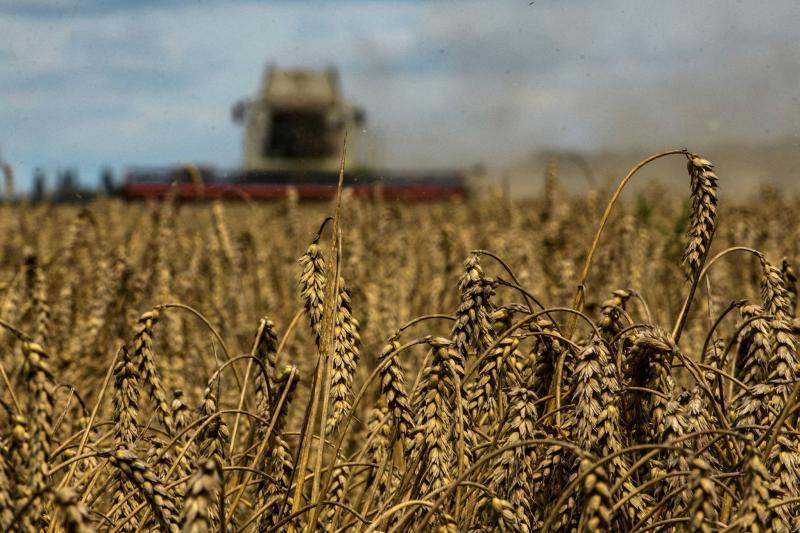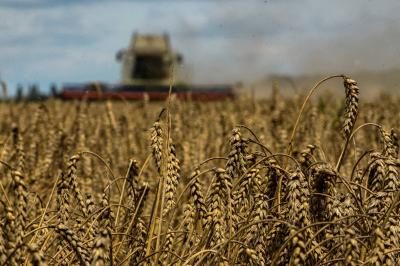Russia announced in a message to the International Maritime Organization of the United Nations that its withdrawal from the agreement allowing safe export of Ukrainian grain via the Black Sea means the cancellation of navigation safety guarantees issued by the Russian side. The message, which Reuters reviewed, stated that Russia "will take necessary preemptive measures to thwart threats posed by the Kyiv regime in the region, given the continued armed provocations and attempts to attack Russian military and civilian targets."
Kremlin spokesperson Dmitry Peskov noted on Monday that "Russia has suspended its participation in the grain export agreement via the Black Sea." Peskov stated, "In reality, the validity of the Black Sea agreement has ended today. Unfortunately, the part concerning Russia in the agreement has not yet been implemented, hence it has ended." He added, "Once the part related to Russia is fulfilled, the Russian side will immediately return to implementing the agreement."
U.S. Secretary of State Antony Blinken expressed regret that Russia's decision to halt its participation in the grain export agreement was "unreasonable" and called for a swift return to the agreement. He added, "Washington is monitoring the situation following an attack that destroyed a land bridge linking Crimea to southern Russia, noting that Ukraine decides how to conduct its war."
The Russian Foreign Ministry, as reported by TASS news agency, stated it had officially informed Turkey, Ukraine, and the United Nations that it opposes extending the grain export agreement in the Black Sea. The Russian Foreign Ministry confirmed that it "would be ready to discuss the possibility of returning to the grain export agreement if it sees tangible results," adding that "its demands have not been met so far." The statement went on to say, "Despite United Nations efforts to extend the agreement, there are still obstacles to the exports of Russian food and fertilizers."
In contrast, Ukrainian President Volodymyr Zelensky's spokesperson, Serhiy Nikiforov, reported on Monday that the president said "everything possible must be done to keep the grain export corridor through the Black Sea operational." Zelensky commented after Russia's decision to suspend its participation in the grain export agreement, stating, "Even without the Russian Federation, everything must be done so we can use this Black Sea corridor; we are not afraid." He continued, "Companies and ship owners have contacted us. They said they are ready, and if Ukraine allows them to leave, and Turkey continues to permit their passage, then everyone will be prepared to continue grain supplies."
Adam Hodge, spokesperson for the U.S. National Security Council, stated that "Russia's suspension of the agreement allowing for the export of grain from Ukraine via the Black Sea will lead to a deterioration in food security and harm millions," urging the Russian government to "immediately reverse its decision."
European Commission President Ursula von der Leyen characterized Russia's decision to suspend the grain export agreement as "selfish," adding that "the European Union will continue to work to ensure food security for poor countries." Von der Leyen condemned Russia's decision on Twitter, stating, "I strongly condemn Russia's decision to end the grain export agreement via the Black Sea despite UN and Turkey's efforts. It is a selfish decision. The EU is working to ensure food security for the most vulnerable groups in the world. The EU's Solidarity Corridors initiative will continue to bring agricultural food products from Ukraine to global markets."
The French Foreign Ministry called on Moscow on Monday to stop "the blackmail" regarding global food security following its suspension of participation in the Ukrainian grain export agreement. The ministry stated, "France condemns Russia's suspension of its participation in the Black Sea grain initiative." It continued, "Russia is solely responsible for halting navigation in this maritime area and imposing an illegal blockade on Ukrainian ports. It must stop its blackmail concerning global food security and reconsider its decision."
United Nations Secretary-General António Guterres expressed that Russia's withdrawal means the termination of the relevant agreement facilitating Russian grain and fertilizer exports, saying, "Russia's decision today will deliver a blow to those in need everywhere." U.S. Ambassador to the United Nations Linda Thomas-Greenfield called the termination of the grain agreement "brutal," adding to reporters, "Russia has dealt yet another blow to the world's most vulnerable populations, this time by suspending its participation in the Black Sea grain initiative." Meanwhile, China's ambassador to the United Nations, Zhang Jun, expressed hope that all parties involved can find a way forward, saying, "We still hope for a comprehensive resolution... by accommodating all parties' concerns."
The agreement, brokered by the United Nations and Turkey last July, aimed to alleviate the global food crisis by allowing safe exports of Ukrainian grain that the Russian-Ukrainian conflict had blocked. The Director-General of the World Trade Organization, Ngozi Okonjo-Iweala, expressed "deep disappointment" over the end of the Black Sea grain agreement, which she described as essential for ensuring global food price stability. She wrote on Twitter, "Black Sea trade in food, feed, and fertilizers is critical for global food price stability. It is sad to say that it is the poor and developing countries that are most affected. Let us keep hope alive for renewal." The agreement had been extended several times, but its term expires today.




